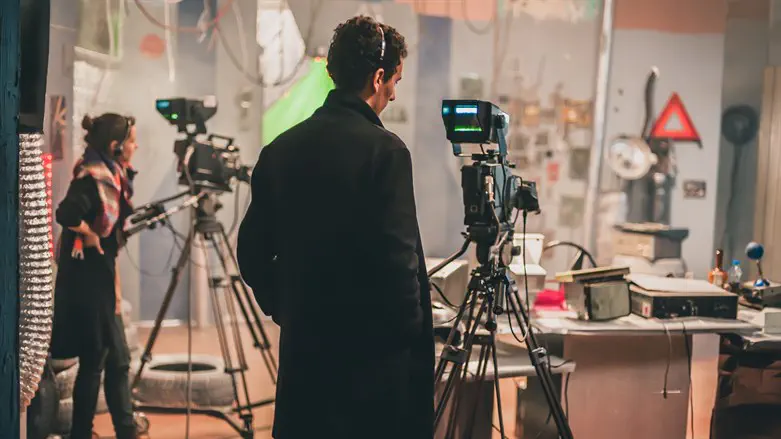
Heated discussions on the X social network: journalists were surprised to find out that news that the censors rejected - were later published in competing media outlets.
Journalists have been criticizing the military censorship in recent days after it rejected their articles that were published shortly after on competing media channels.
For example, the corporation's military reporter Itay Blumenthal posted on his X account that the censors forbade him from publishing a report on the head of the Mossad’s visit to Qatar, but 20 minutes later it appeared on Walla.
Blumenthal wrote: "The censorship rejected my report that the head of the Mossad, Dadi Barnea, landed this morning in Qatar for talks on the release of the hostages and the ceasefire, 20 minutes after Barak Ravid's push in Walla. This is becoming unbearable."
Corporation journalist Avishai Greenzeig, who experienced a similar case this week, responded to Blumenthal's tweet: "This (important) body is becoming a joke with every passing second. This is not an internal personal matter, but a matter of national security."
He added that "if there are no rules and there is no uniform policy that obligates everyone, this body can be shut down and the money can be transferred to the reconstruction of the communities in the south and each journalist can exercise discretion as he wishes."
The editor of the program “From the other side” on Kan News, Udi Hirsch, shared: "It’s not that I had any illusions about the military censorship, but I learned firsthand this week that the considerations that guide it are not (only) related to the security of the state, but to ratings, power and prestige."
Walla reported today that the information about Yahya Sinwar’s meeting with the hostages reported last night on Channel 12 News, was sent for censorship by “Haaretz”, but it chose to reject the item.
Guy Soderi, news editor for Channel 12 News, responded to the report: "The item of Channel 12 News was submitted to the censor long before Haaretz and was rejected. In fact, the censor found out about the incident from us. It was approved only yesterday evening, after they apparently realized that the news would be published anyway according to the accepted practice of reporters who report for foreign media".
Haaretz journalist Chen Manit responded to Soderi: "Guy, Haaretz newspaper had the news and it was rejected by the censors. As soon as the censor permits the publication of information that was submitted for approval, he must inform everyone who requested the publication and not only a specific media outlet, for unknown reasons that the censor did not allow me to publish."
Following the discussion, the head of the freedom of press at the The Union of Journalists in Israel, Anat Saragosti sent a strong letter today (Tuesday) to the Chief Military Censor, Brigadier General Kobi Mandelblit, with allegations of suspected discrimination in the exercise of censorship powers against journalists and media.
"In the last few days, we have witnessed two cases of double standards towards different media outlets, regarding the same news items. One case is related to the Public Broadcasting Corporation. The corporation's legal reporter, Avishai Greenzeig, sent for censorship approval a news item concerning an assessment report by an intelligence agency regarding Hamas’ preparation for the attack. After negotiations, the censorship approved the news item and it was published in the evening news on Kan 11. Some time after the publication, the news was rejected by the censorship, and the broadcasting corporation was requested, and even accepted, to remove the news from the digital platforms. The next day, on Friday evening, News 12's military reporter, Nir Devori, published the same news on the Friday Studio show," Saragosti wrote.
She mentioned another case. "On Sunday evening, News 12 published a report by Amit Segal, according to which Yahya Sinwar met hostages in one of the tunnels and spoke to them in Hebrew. It turns out that Haaretz security commentator, Amos Harel, also had this information. Harel sent the news to the censor for approval, but it was rejected on the grounds that its publication 'reveals the IDF’s capabilities.'"
"We have evidence of at least one more case of news that was rejected when submitted by one media outlet, but the same news was approved to another media outlet. We understand that in a security situation, certainly during wartime, it is vital to ensure the security of the state and censorship is one of the tools that help in this strategy. At the same time, the occurrence of three incidents within a few days raises the suspicion that there is a preference for one media outlet over others," the letter reads.
"Even in times of significant security events, the public's right to know is of ultimate value and so is the freedom of the press. The desire and importance in maintaining state security should also be taken into account and should be carefully considered using such a heavy tool as a ban on publication, which is in the hands of the military censorship. We want to clarify how the military censorship unit intends to ensure that such cases do not repeat themselves. It is worth remembering that even in times of war it is of utmost importance to strengthen public trust. The conduct of double standards harms trust and may cause the systems of journalism to be less strict with the rules of censorship and damage of public trust," Saragosti wrote to the military censor.
